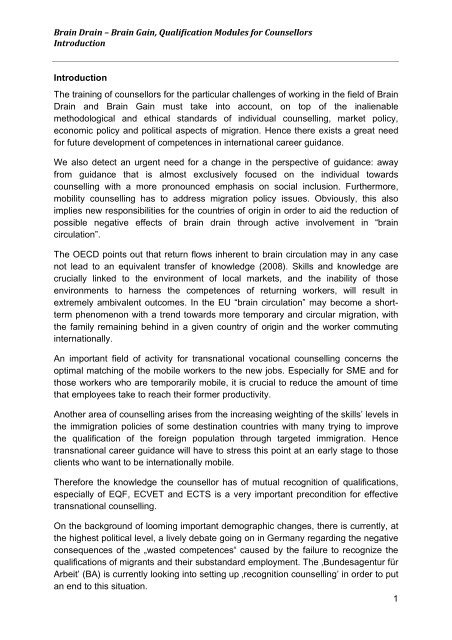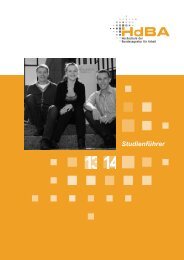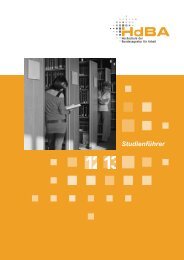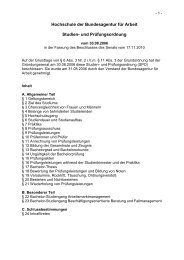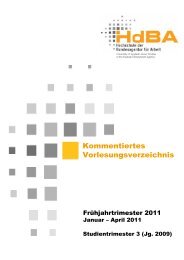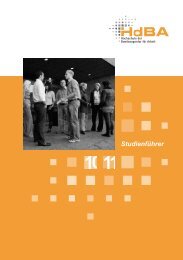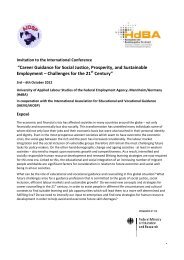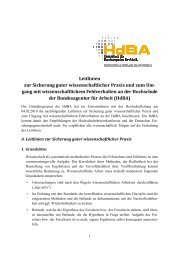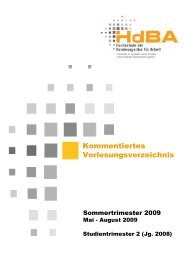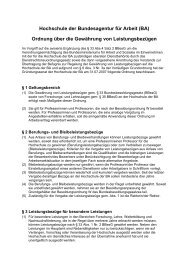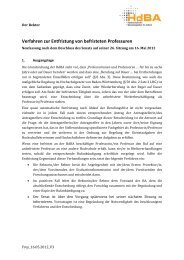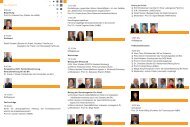Brain Drain - Hochschule der Bundesagentur für Arbeit
Brain Drain - Hochschule der Bundesagentur für Arbeit
Brain Drain - Hochschule der Bundesagentur für Arbeit
You also want an ePaper? Increase the reach of your titles
YUMPU automatically turns print PDFs into web optimized ePapers that Google loves.
����������������������������������������������������������������<br />
�������������<br />
�<br />
�<br />
Introduction<br />
The training of counsellors for the particular challenges of working in the field of <strong>Brain</strong><br />
<strong>Drain</strong> and <strong>Brain</strong> Gain must take into account, on top of the inalienable<br />
methodological and ethical standards of individual counselling, market policy,<br />
economic policy and political aspects of migration. Hence there exists a great need<br />
for future development of competences in international career guidance.<br />
We also detect an urgent need for a change in the perspective of guidance: away<br />
from guidance that is almost exclusively focused on the individual towards<br />
counselling with a more pronounced emphasis on social inclusion. Furthermore,<br />
mobility counselling has to address migration policy issues. Obviously, this also<br />
implies new responsibilities for the countries of origin in or<strong>der</strong> to aid the reduction of<br />
possible negative effects of brain drain through active involvement in “brain<br />
circulation”.<br />
The OECD points out that return flows inherent to brain circulation may in any case<br />
not lead to an equivalent transfer of knowledge (2008). Skills and knowledge are<br />
crucially linked to the environment of local markets, and the inability of those<br />
environments to harness the competences of returning workers, will result in<br />
extremely ambivalent outcomes. In the EU “brain circulation” may become a shortterm<br />
phenomenon with a trend towards more temporary and circular migration, with<br />
the family remaining behind in a given country of origin and the worker commuting<br />
internationally.<br />
An important field of activity for transnational vocational counselling concerns the<br />
optimal matching of the mobile workers to the new jobs. Especially for SME and for<br />
those workers who are temporarily mobile, it is crucial to reduce the amount of time<br />
that employees take to reach their former productivity.<br />
Another area of counselling arises from the increasing weighting of the skills’ levels in<br />
the immigration policies of some destination countries with many trying to improve<br />
the qualification of the foreign population through targeted immigration. Hence<br />
transnational career guidance will have to stress this point at an early stage to those<br />
clients who want to be internationally mobile.<br />
Therefore the knowledge the counsellor has of mutual recognition of qualifications,<br />
especially of EQF, ECVET and ECTS is a very important precondition for effective<br />
transnational counselling.<br />
On the background of looming important demographic changes, there is currently, at<br />
the highest political level, a lively debate going on in Germany regarding the negative<br />
consequences of the „wasted competences“ caused by the failure to recognize the<br />
qualifications of migrants and their substandard employment. The ‚<strong>Bundesagentur</strong> <strong>für</strong><br />
<strong>Arbeit</strong>’ (BA) is currently looking into setting up ‚recognition counselling’ in or<strong>der</strong> to put<br />
an end to this situation.<br />
1


